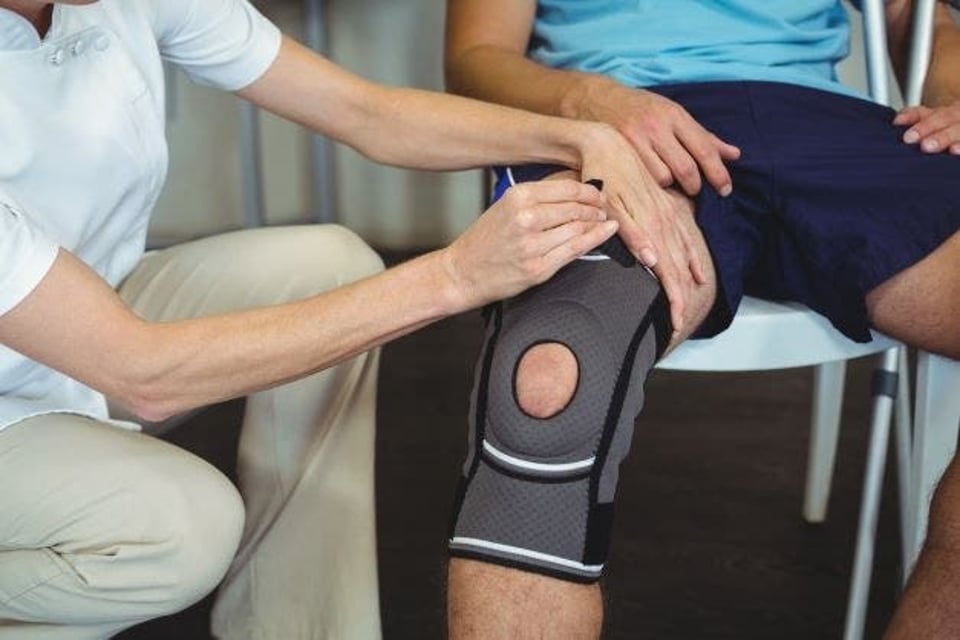Patellofemoral Disorders: Focus on Evaluation

Description
Disorders of the patellofemoral joint are among the most frequent causes of anterior knee pain in patients of all ages. These disorders have a reputation for being tricky to diagnose, leading to suboptimal treatment for some patients. This course provides the rehab professional with the tools to become better diagnosticians in order to improve outcomes for patients with these disorders. The course reviews normal and pathological anatomy and biomechanics of the patellofemoral joint, examines in detail how to complete a comprehensive evaluation for patients with potential patellofemoral disorders, discusses differential diagnosis techniques, provides a brief overview of current surgical interventions, and presents evidence-based treatment choices for this patient population. Science-based intervention is considered “the cornerstone of treatment” for patellofemoral disorders. This course should help increase your confidence in treating patients with these disorders and improve the outcomes that you see in your practice.

Available Course Credits
| Alaska State PT & OT Board | 6.00 | ||
| Arizona State Board of Physical Therapy | 6.00 | ||
| Arkansas State Board of Physcial Thearpy | 6.00 | ||
| California Physical Therapy Board | 6.00 | ||
| Colorado Division of Professions and Occupations | 6.00 | ||
| Connecticut Department of Public Health | 6.00 | ||
| Delaware Examining Board of Physical Therapists and Athletic Trainers | 6.00 | ||
| District Of Columbia Department of Health | 6.00 | ||
| FPTA | 6.00 | ||
| Georgia State Board of Physical Therapy | 6.00 | ||
| Hawaii Board of Physical Therapy | 6.00 | ||
| Idaho Physical Therapy Licensure Board | 6.00 | ||
| Indiana Physical Therapy Board | 6.00 | ||
| Iowa Board of Physical Therapy and Occupational Therapy | 6.00 | ||
| Kansas State Board of Healing Arts | 6.00 | ||
| Kentucky Board of Physical Therapy | 6.00 | ||
| Maine Board of Physical Therapy | 6.00 | ||
| Maryland Board of Physical Therapy Examiners | 0.60 | ||
| Massachusetts Board of Allied Health Professionals | 6.00 | ||
| Michigan Board of Physical Therapy | 6.00 | ||
| Mississippi State Board of Physical Therapy | 6.00 | ||
| Missouri Advisory Commission for Physical Therapists | 6.00 | ||
| Montana Board of Physical Therapy Examiners | 6.00 | ||
| Nebraska Department of Health and Human Services | 6.00 | ||
| New Mexico Physical Therapy Board | 6.00 | ||
| North Carolina Board of Physical Therapy Examiners | 6.00 | ||
| North Dakota Board of Physical Therapy | 6.00 | ||
| Office of Professional Regulation, Vermont Secretary of State | 6.00 | ||
| Oklahoma Board of Medical Licensure and Supervision - Physical Therapy | 6.00 | ||
| Oregon Board of Physical Therapy | 6.00 | ||
| Pennsylvania Bureau of Professional and Occupational Affairs - Physical Therapy | 6.00 | ||
| Physical Therapy Governing Board New Hampshire | 6.00 | ||
| South Carolina Board of Physical Therapy | 6.00 | ||
| South Dakota Physical Therapy License Board | 6.00 | ||
| State of Alabama Board of Physical Therapy | 6.00 | ||
| State of Rhode Island Department of Health | 6.00 | ||
| Tennessee Board of Physical Therapy | 6.00 | ||
| Utah Physical Therapy Licensing Board | 6.00 | ||
| Virginia Board of Physical Therapy | 6.00 | ||
| Washington State Board of Physical Therapy | 6.00 | ||
| Wisconsin Physical Therapy License Board | 6.00 | ||
| Wyoming Board of Physical Therapy | 6.00 |
Course Content
| 474 Patellofemoral Disorders: Focus on Evaluation | Module | ||
| Course Evaluation | Module |
Sarah R.Stillings, MA, PT, MPT, CHT
Sarah R. (Sally) Stillings is a PT and Certified Hand Therapist in Texas. She received her physical therapy degree from the University of North Carolina at Chapel Hill. Prior to becoming a therapist, Sally taught university-level writing courses and was assistant editor of The Journal of Craniomandibular Practice. In her extensive career as a PT, she has held a variety of clinical, teaching, administrative, and business roles, including general PT practitioner, upper extremity specialist, clinic manager, hand therapy clinic coordinator, continuing education (CE) instructor, and CE course administrator. She has also served as Executive Director of the Kellermann Foundation, a U.S. nonprofit organization supporting healthcare and community development in Uganda, East Africa. Her work now focuses on creating evidence-based CE materials for rehab professionals. Sally is a lifelong runner who celebrates all those who cover the ground.

After successfully completing this continuing education course, the learner should be able to:
- Identify relevant anatomical features of the patellofemoral joint and surrounding tissues
- Recognize common bony and soft tissue abnormalities of this region
- Identify patellofemoral pathomechanics and how they may present in patients
- List the attributes of the four most common types of patellofemoral disorders: patellofemoral pain syndromes, instability, chondral injuries, and osteoarthritis
- Differentiate between patellofemoral disorders and other causes of anterior knee symptoms
- Identify all the components of a comprehensive examination for patients with potential patellofemoral dysfunction
- Choose and apply, using case studies, the evaluation elements and therapy interventions appropriate to specific patient presentations
- Apply the principles of conservative management of patellofemoral disorders in a case study
- Identify the most commonly used surgical techniques for patients with patellofemoral disorders
- Recognize when surgical intervention may be recommended
- Recall evidence-based therapy interventions for the most common patellofemoral disorders
474 Patellofemoral Disorders: Focus on Evaluation Table of Contents
Page #
HOUR 1
Course Instructions 2
About the Author / Course Description 3
Course Objectives 4
Table of Contents 5
Introduction 7
Chapter 1: Applied Anatomy and Biomechanics 8
Anatomy Review 8
Bony Anatomy
Soft Tissue Anatomy
Biomechanics 17
Function
Normal Patellar Tracking
Joint Reaction Forces
Pathomechanics of the Patellofemoral Joint
HOUR 2
Chapter 2: Imaging and Differential Diagnosis 28
Imaging 28
Conventional Radiography
Magnetic Resonance Imaging
Computed Tomography
Differential Diagnosis 30
Patellofemoral Pain (PFP)
Instability
Chondral Injuries
Osteoarthritis (OA)
HOUR 3
Chapter 3: Therapy Evaluation 42
Patient History
Physical Examination: Standing 44
Static Standing Posture
Dynamic Assessment
Physical Examination: Seated 51
Patellar Orientation
Range of Motion
Patellar Tracking
Strength Testing
Physical Examination: Supine 55
Observation
Palpation
Range of Motion
Flexibility Tests
Special Tests
HOUR 4
Physical Examination: Side-Lying 61
Physical Examination: Prone
Other Testing 62
Screening Neurological Exam
Dynamic Muscle Testing
Functional Testing
Patient-Reported Outcome Measures
Chapter 4: Medical and Surgical Management 65
Conservative Intervention
Surgical Intervention
Arthroscopy
Cartilage Restoration Procedures
Soft Tissue Techniques
Bony Realignment Techniques
Joint Replacements
Patellectomy
HOUR 5
Chapter 5: Therapy Approaches 75
Postsurgical Rehabilitation
Conservative Rehabilitation
Patient Education
Activity Modification
Exercise
Manual Therapy Techniques
Modalities
Foot Orthoses
Patellar Taping
Patellar Braces
Summary
Conclusion 85
HOUR 6
Case Studies 86
Appendix: Patient Education and Provider Resources 89
References 91
Examination 100
Evaluation 107
Customer Cancellation:
Customers may request cancellations of their enrollment or subscription in our digital or live educational services, subject to the terms outlined below. Cancellation requests must be made in writing, either through email or through our designated cancellation process.
Refund Policy:
Refunds will be provided according to the following guidelines: i) For cancellation requests made within 5 days of the initial enrollment or subscription, a full refund will be issued. Refunds will be issued using the same method of payment used for the original transaction, unless otherwise agreed upon in writing.
Provider Cancellation:
In the event Physicourses cancels your course, you will be issued a full refund or transfered to a course of equal or greater value.
Physicourses Conflict of Interest Disclosure Policy for Authors and Staff:
All persons in a position to control the content of any educational activity (authors or staff from Physicourses) are required to disclose to Physicourses any potentially biasing or potential conflict of interests in relationships of a financial, professional, or personal nature.
The intent of this disclosure is not to prevent authors or staff with commercial affiliations from planning an educational activity, or to prevent a Presenter with commercial affiliations from presenting, but rather to inform Physicourses of any potentially biasing relationships so that conflicts are resolved prior to the activity.
It is the policy of Physicourses to ensure balance, independence, objectivity and scientific rigor in all of its continuing education activities. All relevant conflicts of interest identified by the planner, presenter, or as determined by Physicourses will be disclosed to the audience verbally and in writing prior to the start of the presentation.
Definitions for Authors/Staff:
Relevant financial relationships are those relationships in which you benefit by receiving a salary, royalty, intellectual property rights, gift, speaking fee, consulting fee, honoraria, ownership interest (e.g., stocks, stock options, or other ownership interest, excluding diversified mutual funds), or other financial benefit. Financial relationships can also include “contracted research” where the institution gets the grant and manages the funds and you are the principal or named investigator on the grant.
Educational Level: Intermediate
Target Audience: PT, PTA, OT, OTA
Course Completion Requirements: Passing an online exam with 70% or greater will be required to earn continuing education credit
This course is approved for 0.6 CEUS. 6 contact hours
Physicourses is committed to ensuring accessibility to the most extensive audience possible. If you have any questions or special needs requests, please contact us at info@physicourses.com.